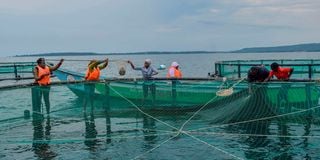Campaign against sex for fish wins Sh112m grants

Great Lakes Feed CEO Mathildah Amollo and Rio Fish CEO Angela Odero during the launch of the Investing in Women in the Blue Economy in Kenya programme at Windsor Hotel, Nairobi, on August 3, 2023.
What you need to know:
- Mathildah Amollo and Angela Odero were Thursday named the first beneficiaries in a Sh1 billion initiative funded by the Canadian government.
- The programme seeks to unlock the potential of women in the blue economy, covering the lake and coastal regions.
Two women fighting the sex-for-fish culture on Lake Victoria beaches have won a grant of Sh56 million each to advance their goals.
Sex for fish is a phenomenon where women traders pay for fish but are forced to have sexual relationships with fishermen to ensure their regular supply.
Mathildah Amollo and Angela Odero were Thursday named the first beneficiaries in a Sh1 billion initiative funded by the Canadian government targeting to unlock the potential of women in the blue economy, covering the lake and coastal regions.
Mathildah Amollo, a former finance manager at Sarova Hotels, left formal employment at 40.
“I had travelled to my rural home when I learnt how rampant jaboya (sex for fish exploitation) had become. My heart broke for these women and I thought to myself there's certainly something that I could do to make a difference.”
She started by lobbying women and facilitating them to get training in the best aquaculture practices. It was during this training that gaps in access to quality feed and fingerlings emerged. In 2018, she registered the company, Greatlakes Feeds, to mainly produce fish feed and fingerlings.
Eye-opener
Angela Odero, on the other hand, had never heard about jaboya, despite growing up in Siaya County. While typing her mother's master's thesis on the impact of sex for fish on the spread of HIV, her eyes were opened to the vice, but it was only after she was married in Homa Bay County, and interacted with women fish vendors first hand, that she realised how much sex for fish had been normalised.
"An incident that triggered me into action was when I met a girl, 13, who was hawking fish with her mother. Not long after, I learnt that she had fallen pregnant by a fisherman. Her mother, who had got old, had given her daughter in her place for them to continue getting their fish supply," she says.
"I was furious, my maternal instinct wanted me to report, but the locals told me the perpetrator was untouchable and reporting would be useless. In my frustrations, I started thinking of solutions on how to supply these women with fish."
Living in Mozambique at the time, it was difficult to explore fishing using boats. She visited friends in Uganda who run fish farms and this was a more plausible solution.
In 2018, Rio Fish was born and today it operates in Migori, Homa Bay, Kisii and Kisumu, supplying over 1,000 women traders with fish, which they buy from smallholders.
The company also runs a fish processing facility in Migori County, a cold storage and cold chain trucks that help traders to avert losses by selling their excess back to Rio Fish.

Angela Odero (left), the founder and CEO of Rio Fish, and her workers prepare to catch fish from a cage in Homa Bay.
Ms Amollo learnt about the grant opportunity from her auditor, while Ms Odero learnt about it from social media after her friends forwarded several messages to her to apply.
Both women lament that the grant application process was quite technical and hectic. They took two months to fill the financial templates, with the financial model bit in the application consuming a lot of time.
“One person had asked that I pay Sh300,00 for him to help fill it, which I thought was crazy. I struggled and did it on my own," said Ms Odero.
Ms Amollo plans on buying machines to optimise feed production. "When I have these machines, I'll be able to buy raw materials in bulk, which will lower the cost of production and make fish feed more affordable for women farmers.”
Additionally, she wants to buy cages and feed for deserving women on the 66 beaches in Siaya with a goal of impacting 1,200 women to become fish producers.
Ms Odero's focus is also to increase women's involvement in production. In the next three years, she hopes to have up to 60 per cent women fish producers. This she will do by training them in the best fish husbandry techniques, helping them access quality input and buying the fish from farmers so that it can end up in the hands of women traders.
Targeted counties
Eleven counties are to benefit from the Investing in Women in the Blue Economy in Kenya Initiative. They are Kilifi, Kwale, Lamu, Mombasa, Taita Taveta, Tana River, Homa Bay, Kisumu, Siaya, Busia, Migori.
Besides the Sh1 billion, Global Canada Affairs is investing Sh2.1 billion in conservation and sustainable management of coastal and marine ecosystems.
During the launch of the initiative, Christopher Thornley, the Canadian High Commissioner to Kenya, said: "Empowering women in the blue economy is not just a matter of social justice; it is a strategic imperative that will accelerate gender equality and drive sustainable economic growth."
The programme will cover technical assistance and capacity building to enhance the livelihoods of 50,000 underprivileged and marginalised communities.
“This will lead to more inclusive and equitable economic growth and contribute to achieving the Sustainable Development Goals, particularly Goal Five on gender equality and Goal 14 on conservation and sustainable use of the oceans,” Cabinet Secretary for Blue Economy Salim Mvurya said.




